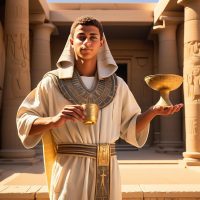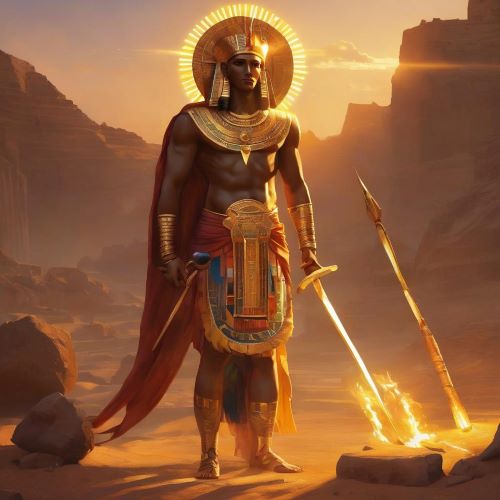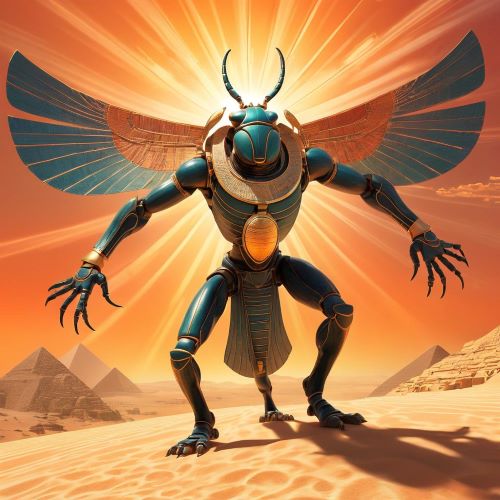Fetket : The Sun God’s Butler
Listen
At a glance
| Description | |
|---|---|
| Origin | Egyptian Mythology |
| Classification | Gods |
| Family Members | N/A |
| Region | Egypt |
| Associated With | Cup Bearing |
Fetket
Introduction
In the grand pantheon of Egyptian mythology, Fetket stands as a subtle yet significant figure—a divine servant whose role exemplifies the discipline and reverence of ancient Egyptian religious practice. Known primarily as the cupbearer of Ra, Fetket represents the perfect embodiment of sacred service and ritual precision. While he does not possess the commanding presence of gods like Horus or Osiris, his inclusion in the solar court of Ra underscores how every aspect of divine function was essential in maintaining cosmic balance. Fetket’s myth reflects the Egyptian worldview where even the smallest act, performed in alignment with Ma’at, the principle of universal order and truth held profound spiritual importance.
Physical Traits
Unlike many Egyptian deities known for animal-headed forms or elaborate iconography, Fetket is portrayed as a fully human figure. He is often imagined as a youthful man holding a libation vessel, symbolizing his primary duty as the server of Ra’s drink. His clothing, consisting of a clean white linen kilt and a ceremonial sash, mirrors the attire of high-ranking temple attendants or priests, reflecting purity and respect for divine protocol. Some artistic interpretations include a faint solar disk above his head, visually connecting him to Ra, the supreme sun god. His human form distinguishes him from other deities and highlights his role as an intermediary—divine enough to serve the gods, yet relatable in his humanlike devotion and discipline.
Family
There is no direct evidence of Fetket’s family within surviving Egyptian texts, which makes him a rare example of a deity defined purely by his function rather than lineage. Most Egyptian gods were interconnected through elaborate genealogies, Amun and Mut as divine parents, Horus as their child, and so on. Fetket, however, exists independently, devoted solely to his service within the solar court. His identity does not rely on ancestry or power but on duty and constancy. This lack of familial ties symbolizes his exclusive connection to Ra and the celestial hierarchy, suggesting that Fetket was less a personal deity of worship and more a personification of loyalty and sacred service.
Other names
In ancient records, Fetket is usually referred to by his name alone or with descriptive titles such as “Fetket the Cupbearer” or “Servant of Ra.” These titles emphasize his divine occupation rather than suggest alternate identities. Unlike other gods whose names varied across regions or time periods, Fetket’s designation remains remarkably consistent, indicating that his cult was not widely spread but instead focused on his symbolic role in Ra’s court. The constancy of his name reinforces his identity as a steadfast attendant, eternally linked with his solar master.
Powers and Abilities
Fetket’s powers are rooted not in magic or warfare but in ritual function and cosmic maintenance. As Ra’s cupbearer, he was responsible for offering the divine drink that sustained the sun god’s vitality and, by extension, the order of the universe. This act may seem mundane, but within the context of Egyptian theology, it was profoundly sacred. The nourishment of Ra symbolized the continuous cycle of renewal, ensuring that the sun rose and set without disruption. Fetket’s service thus became a metaphor for the sustaining forces of nature, quiet, unseen, yet indispensable.
Through his careful offerings, Fetket also embodies the principle of Ma’at, maintaining harmony in the solar realm. His actions parallel those of priests who performed libations in temples, cleansing and refreshing divine statues to restore balance and energy. Fetket, therefore, stands as the celestial counterpart to earthly temple attendants, linking heaven and earth through ritual care. In some interpretations, he is seen as a purifier, ensuring that only sanctified offerings reach the sun god, thereby preventing spiritual decay and preserving divine order.
Modern Day Influence
Although Fetket does not enjoy the same level of recognition as Ra, Isis, or Anubis in modern culture, his symbolism has quietly persisted through archetypes of loyalty and service. The figure of the devoted attendant, calm, efficient, and indispensable, echoes through literature and cinema, reflected in characters such as Alfred from Batman or Jarvis in Iron Man. These modern figures mirror Fetket’s essence: unwavering service to a greater power, performed with precision and grace.
In academic and Egyptological circles, Fetket is often studied as a representation of ritual purity and sacred duty. His presence in texts and inscriptions, though limited, provides scholars with insight into how ancient Egyptians perceived the structure of divine hierarchy. Even gods required attendants, mirroring the human royal courts of pharaohs and reinforcing the notion that heaven functioned as an ordered kingdom. Fetket’s service role thus bridges divine and human institutions, revealing how ancient society viewed discipline and respect as cosmic virtues.
Within contemporary Kemetic reconstructionist practices, a movement seeking to revive ancient Egyptian spiritual traditions, Fetket has gained modest attention. Practitioners invoke him during rituals of purification, offerings, and blessings, recognizing him as a guardian of sacred hospitality. His name occasionally appears in digital artworks and modern mythology databases, where he is portrayed as the “divine steward of light.” This interpretation reimagines Fetket not only as Ra’s butler but also as a spiritual archetype representing devotion to purpose and duty in the face of obscurity.
While major deities continue to dominate popular imagination, figures like Fetket enrich the understanding of Egyptian mythology by illustrating that every role in the divine cosmos, no matter how humble, carried eternal importance. In the ancient worldview, Ra’s journey across the sky was not merely an act of power but a ritual performance supported by divine attendants like Fetket. His quiet presence symbolizes the unseen work that sustains greatness, a timeless reminder that service and humility are as sacred as might and glory.
Related Images
Source
Hart, G. (2005). The Routledge Dictionary of Egyptian Gods and Goddesses. Routledge.
Wilkinson, R. H. (2003). The Complete Gods and Goddesses of Ancient Egypt. Thames & Hudson.
Pinch, G. (2004). Egyptian Mythology: A Guide to the Gods, Goddesses, and Traditions of Ancient Egypt. Oxford University Press.
Egypt: Fetket – The Sun God’s Butler. Tour Egypt. https://www.touregypt.net/godsofegypt/fetket.htm
List of Egyptian deities. Wikipedia. https://en.wikipedia.org/wiki/List_of_Egyptian_deities
Ancient Egyptian Mythology Wiki. Fetket. https://ancient-egyptian-mythology.fandom.com/wiki/List_of_Gods_and_Goddess’
Do we know anything major about Fetket, Ra’s bartender? Reddit. https://www.reddit.com/r/ancientegypt/comments/cmtwwy/do_we_know_anything_major_about_fetket_ras/
Egyptopw.com. Egyptian Gods and Goddesses – The Routledge Dictionary. https://www.egyptopw.com/rc_images/egyptian_gods_and_goddesses___the_routledge_dictionary.pdf








